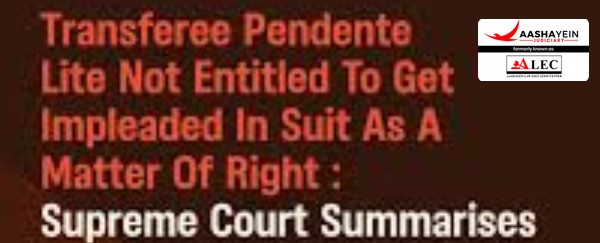A Bench comprising of Justice JB Pardiwala and Justice R Mahadevan
Introduction:
The Supreme Court, in its decision addressed the issue of whether a pendente lite transferee (someone who acquires property during the pendency of a suit) has an automatic right to be impleaded in a suit. The Court ruled that a transferee pendente lite has no inherent right to be impleaded as a party to the suit and can only be allowed to do so in exceptional cases where their rights are adversely affected. The Court further clarified the circumstances under which a transferee could appeal despite not being part of the suit.
Facts:
Respondents 1 and 2, who were senior citizens residing abroad, purchased a property that was already the subject of a pending suit for specific performance of an agreement to sell. The trial court rejected their plea to be impleaded in the suit. They did not appeal the rejection. The trial court ultimately ruled in favor of the plaintiff and ordered the execution of the sale deed in favor of the plaintiff. Respondents 1 and 2, as pendente lite transferees, felt aggrieved by the judgment and sought leave from the Karnataka High Court to appeal, despite not being parties to the original suit. The High Court granted them leave to appeal, finding that they were adversely affected by the trial court’s decision. The plaintiff, aggrieved by the High Court’s decision, appealed to the Supreme Court, arguing that the pendente lite transferees had no right to appeal without being impleaded.
- Order XXII Rule 10 CPC – This rule relates to the continuation of a suit after the transfer of interest in the subject matter of the suit.
- Section 52 of the Transfer of Property Act, 1882 – This provision provides that a transfer of property pending a suit is subject to the outcome of the suit and does not affect the suit's resolution.
You can also read the Blog by visiting [Blog]
For more information, visit [Aashayein Enquiry Section]
Issues:
- Whether a transferee pendente lite has an automatic right to be impleaded in a suit?
- Whether a transferee pendente lite can appeal a decree despite not being impleaded in the suit?
- Whether the High Court erred in granting leave to appeal to the pendente lite transferees?
Contention of Petitioner:
The plaintiff argued that the High Court erred in allowing Respondents 1 and 2 (the transferees) to appeal against the trial court's decision without their impleadment in the suit. The plaintiff contended that no person outside the suit should be granted the right to appeal unless their rights are specifically affected by the judgment.
Contention of Respondents:
Respondents 1 and 2 argued that they were adversely affected by the trial court’s decision as they purchased the property during the pendency of the suit. They contended that they were entitled to be impleaded in the suit and that the trial court’s judgment impacted their rights as property transferees.
Conclusion:
The Supreme Court set aside the High Court’s decision to allow the pendente lite transferees to appeal, ruling that a transferee pendente lite does not have an automatic right to be impleaded in the suit. The Court stated that such transferees could only appeal if their rights were directly and adversely affected. Since the sale of the property was subject to the outcome of the suit under Section 52 of the Transfer of Property Act (This provision provides that a transfer of property pending a suit is subject to the outcome of the suit and does not affect the suit's resolution), the Court held that the transferees’ rights were not sufficiently jeopardized to warrant granting leave to appeal without impleament.

